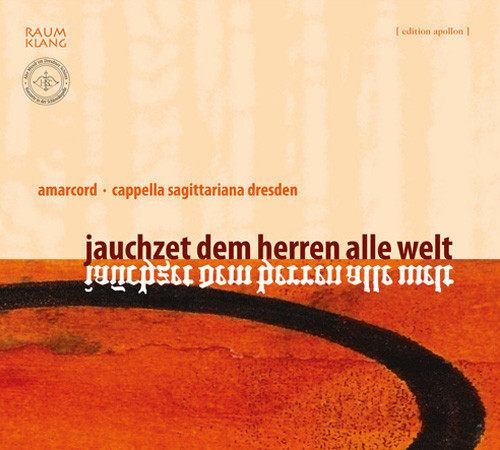„Jauchzet dem Herren alle Welt“
Schütz und Italien – Schütz und die Italiener/ Schütz and Italy – Schütz and the Italians
Musik aus der Dresdner Schlosskapelle (II)/ Music from the Dresden Castle Chapel (II)
„Fest der Sinne“ und „Geniale Fortsetzung einer Zusammenarbeit“ schrieb die Sächsische Zeitung aus Anlass eines Konzertes mit eben diesem Programm bei den Mitteldeutschen Heinrich-Schütz-Tagen in Dresden im Oktober 2010.
Italien – Seit jeher gilt das sonnenverwöhnte Land im Süden Europas als Inbegriff von Kunst und Kultur. Wie in Malerei, Bildhauerei und Architektur ging auch in der Musikgeschichte manch entscheidende Neuerung von Italien aus. Im 16. und 17. Jahrhundert war es vor allem Venedig, das als Zentrum der Musikpflege wie ein Magnet junge Komponisten aus aller Herren Länder anzog, um dort ihre künstlerischen Fähigkeiten zu vervollkommnen. So reiste auch Heinrich Schütz im Jahr 1609 erstmals in die Lagunenstadt und dieser Besuch sollte für sein weiteres Leben und kompositorisches Schaffen entscheidend sein. Diesem prägenden Einfluss Italiens in den unterschiedlichen Epochen seines Schaffens widmet sich die neue CD „Jauchzet dem Herren alle Welt“: Beginnend mit einem Stück aus den „Italienischen Madrigalen“, die Schütz nach Studien bei G. Gabrieli geschrieben hat, über das doppelchörige Psalmkonzert „Ich danke dem Herrn von ganzem Herzen“ aus den Psalmen Davids, das berühmte „Gloria a 7“ von Claudio Monteverdi, bei dem Schütz 1628 weilte, bis hin zum titelgebenden Stück „Jauchzet dem Herren alle Welt“ aus Schütz’ Opus ultimum, dem „Schwanengesang“.
„Feast of the senses“ and „Ingenious continuation of a collaboration“ wrote the Sächsische Zeitung on the occasion of a concert with this very program at the Central German Heinrich Schütz Days in Dresden in October 2010.
Italy – The sun-kissed land in southern Europe has always been considered the quintessence of art and culture. As in painting, sculpture, and architecture, in the history of music, too, many a decisive innovation came from Italy. In the sixteenth and seventeenth centuries, it was above all Venice that, as the center of music cultivation, attracted young composers from throughout the world, who wanted to perfect their artistic skills there. Thus, in 1609, Heinrich Schütz, too, traveled to the city on the lagoon for the first time, a visit that was to be decisive for his further life and compositional work. The new CD “Make a joyful noise unto the Lord” is dedicated to Italy’s formative influence during the various epochs of Schütz’s creative work: starting with a piece from the Italian Madrigals, which Schütz wrote after his studies with Giovanni Gabrieli, through the double-choir psalm concerto “Ich danke dem Herrn von ganzem Herzen” from the Psalmen Davids, the famous Gloria à 7 by Claudio Monteverdi, whom Schütz visited in 1628, to the piece “Jauchzet dem Herren alle Welt,” which provided the title of this CD, from Schütz’s Opus ultimum, the “Schwanengesang” (“Swan Song”).

